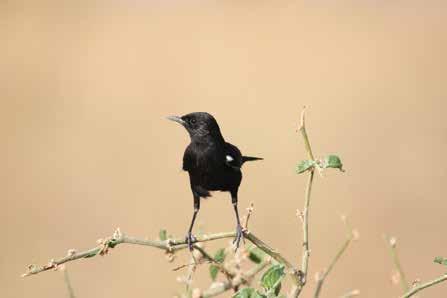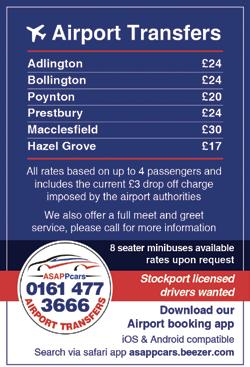
4 minute read
Is Birdwatching For You?
How many species of birds can you identify in your garden or locality? The chances are that you can identify quite a few but sometimes you may look at a bird and momentarily wonder what it is.
You may also have joined in the RSPB Big Garden Birdwatch which has helped our understanding and enjoyment of local birds.
Advertisement
The celebrated sportswriter and nature lover Simon Barnes wrote a book a few years ago entitled ‘How to be a bad birdwatcher’. This is a light-hearted look at birdwatching, but the basic premise is that if you can identify a common bird such as a robin or swan, you are a birdwatcher without realising it! The likelihood is that most people are content to have a general interest in birds without owning a pair of binoculars. Some would like to take this interest a bit further but haven’t got around to it or are not sure what to do. Here are some ideas to share with you.
Make your garden wildlife friendly
There is plenty of information online and elsewhere to make your garden wildlife friendly. Suggestions include nest-boxes, bug homes, feeders, bird and insect-friendly plants, ponds, safe havens and good access for wildlife.
Join a conservation organisation
The Royal Society for the Protection of Birds will probably spring to mind. The RSPB has evolved into a conservation organisation with the strapline of ‘Give Nature a Home.’ For as little as £5 a month for two people (£6 for a family) you get free access and parking to around 170 RSPB reserves plus regular magazines, offers etc. There is also a Young Explorers section that educates children on environmental matters (note for grandparents- a good option for a present!)
However, the real point here is the cause rather than the benefits. Far too many species including birds, butterflies and the rest of our fauna, are in
serious decline for a number of reasons. We need to maintain and improve the habitat we have left and try to prevent unnecessary destruction of ecosystems. The RSPB and other similar organisations can only survive by members’ subscriptions and with the current state of nature the case for choosing a conservation organisation as a charity of choice has grown stronger.
You can join the RSPB online or, if you join at one of our nearest reserves such as Burton Mere Wetlands on the Wirral, your membership will contribute directly to the reserve. www.rspb.org.uk
Attend local group meetings
Whether you are a member of the RSPB or not, there is a choice of local groups that have regular meetings and outings. In our vicinity we have High Peak, Stockport and Macclesfield Groups. At High Peak we meet in Marple between September and May on the third Monday of the month at 7.30pm. Details are published in this magazine and on our website. We usually have between 40 and 70 people attending; our speakers are drawn from around the country and are chosen for their high quality. Annual membership is currently £10pa.
Explore your local environment
There is a surprising number of bird species in our local area, more easily seen and heard in springtime and early summer. In 2019, 220 species were recorded in Derbyshire alone!

High Peak RSPB group has an outing once a month on a Sunday, usually to a reserve or similar area where interesting birds may be found. Car-sharing is arranged on the day. Other groups do the same and Stockport Group also run coach trips. Not everyone who comes along has a good knowledge of birds, but friendly, experienced members are on hand to identify different species, and where possible show them through a telescope.

A weekend walk will be held by High Peak RSPB as an introduction to finding birds by sight and sound on Sunday 26 April at 9.30am. We meet at Etherow Country Park and the walk lasts two to three hours. If there is sufficient demand, a car trip to Burton Mere Wetlands RSPB reserve will be arranged on a suitable date. If you are interested in either of the above, we’d love to hear from you! (contact details below)
In conclusion it doesn’t matter if you are a good or a bad birdwatcher, but it has never been more important and beneficial for all of us to connect with nature. After all, what is good for birds is good for us!
Email: highpeakgroup2@gmail.com Phone: (Secretary) 0161 427 0881
www.rspb.org.uk/groups/highpeak
David Knass (Secretary, High Peak RSPB Group) Richard Stephenson (Leader, High Peak RSPB Group)














